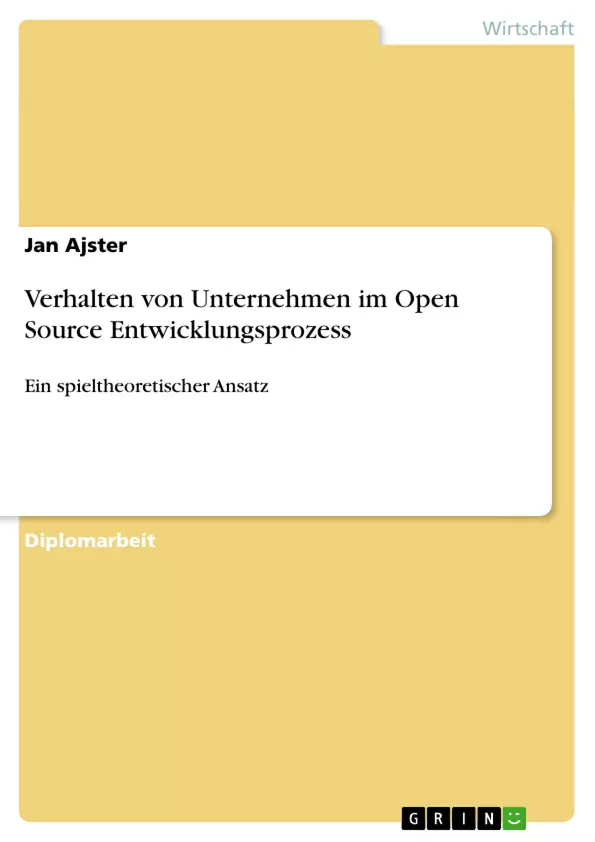Zum Zweck der Betrachtung des Verhaltens von Unternehmen im Entwicklungsprozess von Open Source Software wurde auf Basis eines spieltheoretischen Ansatzes ein Modell entwickelt, welches näheren Aufschluss über die Einflussfaktoren und das resultierende Verhalten der Unternehmen geben kann.
Inhaltsverzeichnis
- 1. Einleitung
- 2. Open Source Software - Definition und Literaturüberblick
- 2.1. Allgemeine Abgrenzung von Open Source Software
- 2.2. Lizenzmodelle in der Open Source Entwicklung
- 2.3. Die Open Source Community
- 2.4. Warum in einer Open Source Community entwickelt wird
- 2.4.1. Sozialwissenschaftliche Betrachtung
- 2.4.2. Betriebswirtschaftliche Betrachtung
- 2.4.3. Volkswirtschaftliche Betrachtung
- 2.5. Zielsetzung der Arbeit
- 3. Das spieltheoretische Modell
- 3.1. Modellannahmen
- 3.2. Das Grundmodell
- 3.3. Erweiterung auf mehrere Perioden
- 3.4. Die Modulartität von Software
- 4. Auswertung der Simulation
- 4.1. Szenario - tmax = M
- 4.2. Szenario - tmax = M - 1
- 4.3. Szenario - tmax = M
- 4.4. Szenario - tmax = M + 2
- 4.5. Szenario - tmax = 10. M
- 5. Interpretation der Simulationsergebnisse
- 6. Zusammenfassung und Ausblick
Zielsetzung und Themenschwerpunkte
Die Diplomarbeit untersucht das Verhalten von Unternehmen im Open Source Entwicklungsprozess. Im Mittelpunkt steht ein spieltheoretisches Modell, welches die Entscheidungsfindung von Unternehmen in einer Open Source Community simuliert. Ziel der Arbeit ist es, die Dynamik des Open Source Entwicklungsprozesses zu analysieren und die Faktoren zu identifizieren, die den Erfolg von Open Source Projekten beeinflussen.
- Die Definition und Charakteristika von Open Source Software.
- Die Bedeutung der Open Source Community für die Entwicklung von Software.
- Die Anwendung spieltheoretischer Modelle zur Analyse von Unternehmenshandeln im Open Source Kontext.
- Die Auswirkungen der Modularität von Software auf die Entwicklung von Open Source Projekten.
- Die Interpretation der Simulationsergebnisse und die Ableitung von Empfehlungen für Unternehmen.
Zusammenfassung der Kapitel
- Kapitel 1: Einleitung: Diese Einleitung stellt die Relevanz der Open Source Software im heutigen Markt dar und erläutert die Motivation für die Wahl des Themas. Die Forschungsfrage wird definiert und die Struktur der Arbeit skizziert.
- Kapitel 2: Open Source Software - Definition und Literaturüberblick: Dieses Kapitel definiert den Begriff "Open Source Software" und bietet einen umfassenden Literaturüberblick zum Thema. Es werden verschiedene Lizenzmodelle im Open Source Entwicklungsprozess sowie die Rolle der Open Source Community beleuchtet. Die Motivation von Unternehmen, sich in Open Source Projekte einzubringen, wird aus sozialwissenschaftlicher, betriebswirtschaftlicher und volkswirtschaftlicher Perspektive betrachtet.
- Kapitel 3: Das spieltheoretische Modell: In diesem Kapitel wird das spieltheoretische Modell vorgestellt, welches die Grundlage für die Analyse der Unternehmensentscheidungen im Open Source Entwicklungsprozess bildet. Das Modell wird zunächst in einer einperiodigen Betrachtung eingeführt und anschließend auf mehrere Perioden erweitert. Die Modularität von Software wird als ein wichtiger Faktor in das Modell integriert.
- Kapitel 4: Auswertung der Simulation: Dieses Kapitel präsentiert die Ergebnisse der Simulation des spieltheoretischen Modells. Verschiedene Szenarien werden betrachtet, die sich in der Länge des Zeithorizonts (tmax) und der Modularität der Software (M) unterscheiden.
Schlüsselwörter
Open Source Software, Open Source Entwicklung, Open Source Community, spieltheoretisches Modell, Modularität, Simulation, Unternehmenshandeln, Erfolg von Open Source Projekten.
Häufig gestellte Fragen
Warum beteiligen sich Unternehmen an Open Source Projekten?
Unternehmen nutzen Open Source aus betriebswirtschaftlichen Gründen, um Entwicklungskosten zu teilen, Standards zu setzen oder von der Innovationskraft der Community zu profitieren.
Welche Rolle spielt die Spieltheorie in dieser Arbeit?
Sie dient als Modell, um das strategische Verhalten und die Entscheidungsfindung von Unternehmen innerhalb einer Open Source Community mathematisch zu simulieren.
Was bedeutet "Modularität" für Open Source Software?
Modularität erlaubt es, Software in unabhängige Teile zu zerlegen, was die Zusammenarbeit vieler Entwickler erleichtert und den Entwicklungsprozess effizienter macht.
Welche Lizenzmodelle gibt es in der Open Source Entwicklung?
Es gibt verschiedene Modelle, die regeln, wie die Software genutzt, verändert und weitergegeben werden darf, was das Verhalten der beteiligten Firmen stark beeinflusst.
Was sind die Erfolgsfaktoren für Open Source Projekte?
Die Arbeit identifiziert Faktoren wie eine aktive Community, klare Lizenzregeln und eine hohe Modularität der Software als entscheidend für den Projekterfolg.
- Quote paper
- Jan Ajster (Author), 2006, Verhalten von Unternehmen im Open Source Entwicklungsprozess, Munich, GRIN Verlag, https://www.grin.com/document/78147



